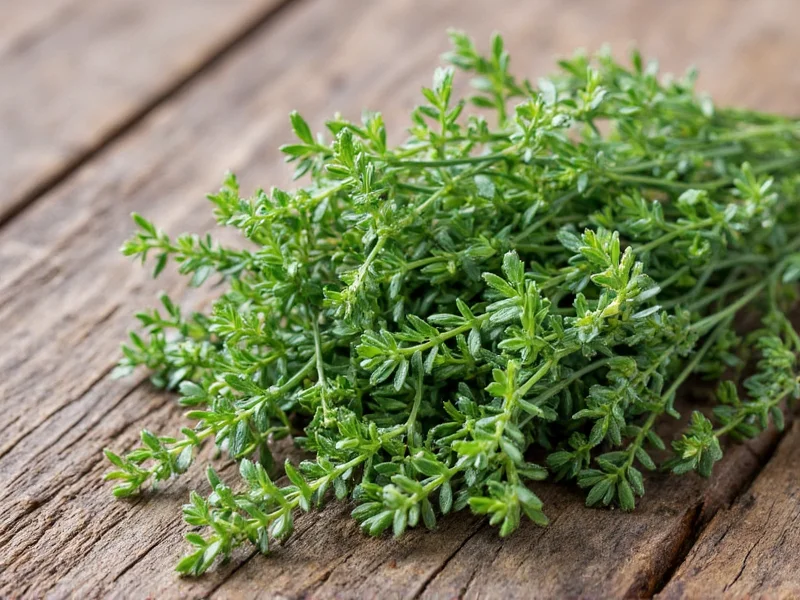When your recipe calls for thyme but your spice rack is empty, knowing reliable herb alternatives keeps your cooking on track. Whether you've run out of thyme, dislike its distinctive flavor, or need options for dietary restrictions, understanding proper substitutions maintains your dish's integrity without compromising taste.
Top Culinary Substitutes for Thyme
Thyme's unique earthy, slightly minty flavor with subtle lemon notes makes it a staple in many cuisines. Finding suitable alternatives requires understanding both flavor profiles and appropriate substitution ratios. Here are the most effective replacements:
Oregano: The Closest Flavor Match
Oregano serves as the most accessible thyme alternative with its similar earthy profile, though it carries a stronger, more pungent flavor. When seeking what herb can replace thyme in Italian dishes, oregano proves particularly valuable. Use a 1:1.5 ratio—meaning if your recipe requires 1 teaspoon of thyme, substitute with 1.5 teaspoons of oregano. This adjustment prevents overpowering your dish while maintaining the herbal complexity thyme would provide.
Marjoram: The Milder Option
Marjoram offers a softer, sweeter alternative to thyme with comparable floral notes but less intensity. This makes it ideal for substituting thyme in delicate sauces and poultry dishes. Unlike oregano, marjoram works at a 1:1 ratio, allowing direct replacement without flavor imbalance. Its gentle nature particularly benefits creamy sauces and vegetable preparations where robust herbs might dominate.
Savory: The Underrated Twin
Often called "thyme's cousin," savory shares remarkable flavor similarities with thyme, featuring comparable peppery notes with a hint of pine. Summer savory works best as a direct substitute for thyme in bean dishes and stews at equal measurements. Winter savory offers a stronger alternative better suited for heartier meats. Both varieties maintain the earthy backbone thyme provides without dramatically altering your recipe's intended flavor profile.
Rosemary: For Bold Applications
Rosemary delivers a more assertive pine-like flavor that works well when replacing thyme in roasted meats and robust dishes. Due to its intensity, use only half the amount of rosemary compared to thyme (1 tsp thyme = 0.5 tsp rosemary). This powerful herb shines in Mediterranean recipes, particularly with lamb, potatoes, and hearty root vegetables where its bold character complements rather than competes.
| Herb | Flavor Profile | Substitution Ratio | Best Culinary Uses |
|---|---|---|---|
| Oregano | Earthy, pungent, slightly bitter | 1:1.5 (thyme:oregano) | Tomato sauces, pizza, grilled meats |
| Marjoram | Sweet, floral, mild | 1:1 | Poultry, creamy sauces, vegetables |
| Savory | Peppery, herbal, slightly piney | 1:1 | Bean dishes, stews, stuffing |
| Rosemary | Pine-like, strong, woody | 1:0.5 | Lamb, roasted potatoes, hearty breads |
| Herbes de Provence | Complex herbal blend | 1:1 | French cuisine, roasted vegetables, marinades |
Specialized Thyme Alternatives
Herbes de Provence: The Blended Solution
This classic French herb mixture typically contains thyme alongside rosemary, marjoram, and other herbs. When searching for what to use instead of thyme in French recipes, Herbes de Provence provides an excellent 1:1 substitute. The blend's complexity compensates for the absence of pure thyme, delivering comparable depth to Mediterranean dishes, roasted vegetables, and marinades.
Basil: For Specific Applications
While not a direct flavor match, basil works surprisingly well as an alternative herb to thyme in tomato-based dishes. Its sweet, slightly peppery profile complements rather than competes with tomato flavors. Use equal amounts when substituting in pasta sauces, but avoid this swap in meat dishes where thyme's earthiness would be missed. Basil shines brightest in summer preparations and fresh applications.
Practical Substitution Guidelines
Successful herb substitution depends on more than just flavor matching. Consider these practical factors when replacing thyme in your favorite recipes:
- Fresh vs. dried: When substituting fresh herbs for dried thyme, use three times the amount (1 tsp dried = 1 tbsp fresh)
- Cooking time: Add stronger substitutes like rosemary later in cooking to prevent bitterness
- Dish type: Robust meats handle stronger substitutes better than delicate fish or egg dishes
- Personal preference: Adjust ratios based on your taste sensitivity to herbal notes
When to Choose Which Substitute
Selecting the right thyme alternative depends on your specific culinary context. For what to substitute for thyme in chicken recipes, marjoram provides the most seamless transition with its gentle flavor. When making vegetable soup without thyme, savory delivers the necessary earthy notes without overwhelming other ingredients. Roasted root vegetables benefit from rosemary's bold character, while tomato-based pasta sauces work best with oregano's Mediterranean profile.
Understanding these nuances ensures your dishes maintain their intended flavor balance even when thyme isn't available. The key to successful substitution lies in recognizing both the flavor profile you need to replicate and the role thyme plays in your specific recipe.











 浙公网安备
33010002000092号
浙公网安备
33010002000092号 浙B2-20120091-4
浙B2-20120091-4